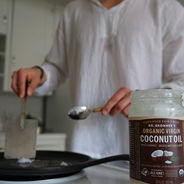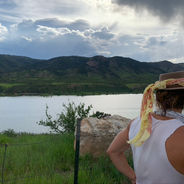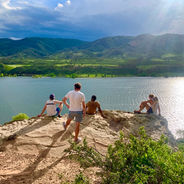Don't Trip on Psychedelic Therapy
- Christian Van Camp

- Jun 11, 2020
- 9 min read
Updated: Apr 24, 2021
Schedule 1 drugs have no medical value & high potential for abuse
-The U.S. Government

Space around me where my soul can breathe
I've got body that my mind can leave
Nothing else matters, I don't care what I miss
Company's okay, solitude is bliss
There's a party in my head
and no one is invited
~ Kevin Parker (Tame Impala)
You chewed on an earthy eighth of mushrooms 45 minutes ago. You feel a little “off.” A warm tingling sensation trickles throughout your body to the tips of your fingers and toes. Nausea settles deep within your core but it isn’t overwhelming enough to obstruct your giddy mood.
You're lying comfortably on a deep-sinking hammock along with your closest friends. It’s a breezy summer saturday. No tasks. No obligations. No work. No worries. Just you, the warm sunshine on your face and the whispering trees providing the perfect amount of shade.

You guys feelin’ shroomy yet?
You all burst out in an uncontrollable, hysterical laughter. You cross your arms over your stomach in an attempt to catch your breath. Tears of joy pour down your face. You can barely talk from emotional exhaustion.
Then, without any understanding of how much time has passed, you decide to sit up in your nest and gaze off in the distance. Nature has never looked this way. Life has never looked this way. You immediately transcend into a pure state of awe. You not only visualize the detailed intricacies of the macro- and microcosm you live upon— you hear them. Trees breathing, birds singing, ants crawling. You feel them. Your 10 toes swim in the earthy mud below while the refreshing breeze and toasty sunlight kiss your skin. You smell them. Blooming flowers, woodsy bark, fresh-flowing air.
Divine dualities are brought into your awareness. Colors, shapes and waves continually expand and contract. You're basking in a field of complete compassion, love and understanding for 5 more hours… yet this memorable moment sticks with you a lifetime.
Psychedelics

Right away you may picture groovy tie-dye flowers and long-haired hippies candidly frolicking at a music festival. Or perhaps you think beyond these mystery machine scenes and self-discovery, spiritual growth, and some form of enlightenment pops into your head.
Regardless of what you may believe in, mind-altering substances like psychedelics have been ingrained in our human genome for millenia. They weren’t put on this green/blue ball floating through space for no reason. God, or whatever higher power you may (or may not) believe in, knew we primates would discover these kaleidoscopic compounds.
Think about this: they’re all created in nature.
Mescaline from the peyote cactus, lysergic acid diethylamide synthesized from rye fungus, 5-MeO-DMT extracted from the Sonora Desert toad, psilocybin in special species of fungi… the list goes on and on.

Sure, you could argue pharmaceuticals are originally from nature but they sit on another level. Pharmaceuticals are artificially ultra-synthesized to close the consciousness; they were designed to amplify the ego. On the other hand, psychedelics disintegrate the ego (something we all have too much of).
Whether you’re a psychedelic first-timer or an experienced psychonaut, I am sure you know all about the power of these substances. They aren’t to be taken lightly. I have come across a great deal of individuals who don’t understand their potent potential. Psychedelics can transform your entire scope of life in one single dose. Although they host a wild party in your head — these certainly aren’t party drugs. They are spirit molecules.
There is nothing inherently wrong with escaping your ego and riding that wild roller coaster on a night out with friends. But if you don’t carry an in-depth intention to why you're delving into these spiritual medicines — psychedelics can turn on you real quick. That’s why “bad trips” exist.
Bad trips are basically lacking any sense of control over your mind, body, and spirit. Some close friends of mine have shared vivid stories of these life-changing situations. They are frightening and unpleasant experiences triggered by past traumas, irresponsibility of the user or the lack of proper preparation for the trip. That’s why many individuals like Michael Pollan, the author of How to Change Your Mind, emphasize the importance of set and setting.

The set is how you are feeling the day of your trip. It's your feelings, expectations, emotions and energy going into the upcoming psychedelic experience. Your internal workings is how I like to view the set.
Then there’s your setting which is your external environment during this brain-vacation. It's the exogenous portion of the psychedelic experience; the social and physical environment.
Who will you be surrounding yourself with? Trustworthy, fun-loving and soothing friends?
Where will you be before, during and after? Will you be rooted in nature or at your buddies apartment with colorful tapestries and resonating music?
Now now now... bad trips aren’t ‘bad’ per say but they certainly can be viewed as “challenging.” Sure, the experience probably felt like a temporary eternity of unpleasant or threatening thoughts and feelings, but afterwards—with healthy intentions—you can grasp long-lasting empowerment. Instead of focusing on the negativity, focus on how the challenging trip opened up new gates of thinking. It has the potential to greatly benefit you when properly resolved and reflected on.

Psychedelic therapy is an essential field to human existence, especially during these unprecedented times. Although it began in the 1950s to treat addiction and alcoholism, it went through some strange cycles shortly after. The US government ramped up the “war on drugs” in the early 60s, then by 1970, President Nixon stamped the Controlled Substances Act which outlawed psilocybin, mescaline, LSD, and DMT. This put a saddening halt on psychedelic research. These therapeutic wonder-drugs came to a stand-still because of toxic media and shady politics. Governmental agencies were influenced by the emerging pill-popping entities (big pharma). They perpetrated psychedelics as immoral and destructive.
However, since the 1990s psychedelics have been brought back into our awareness. Scientists understand their ability to help people foster healthier relationships, careers, hobbies, and livelihoods.
In my humble opinion, Psilocybin, LSD, and MDMA are the pioneers in psychedelic therapy. Out of the bucket list of psychedelics, these three compounds deserve the golden throne for treating anxiety and depression associated with terminal cancer, psychoneuroses, and opiate addiction. Beyond therapy, however, these psychedelics can indeed promote wellbeing and sacredness in all human life.
Psilocybin

Psilocybin is the prominent compound found in magic mushrooms— this “fun guy” molecule knows what’s up. Even the FDA considers psilocybin a ‘breakthrough therapy’ for treating depression! That says A LOT considering the FDA is considered the big brother of food and drug control.
The FDA most definitely leans towards widespread pharmaceutical drug use because of their money-making power. These drugs were designed to mask our issues, pains and ailments, therefore keeping us sick and out-of-tune, ready to make that special drive to the pharmacy once more.
They have their place but are nowhere near the power of psilocybin.
A clinical psychologist named Rosalind Watts describes how Magic Mushrooms (Psilocybin), when used in a therapeutic setting, have been found to be a very effective treatment for depression. In this TEDTalk she talks about her personal experiences as working as a therapist. Not just any ordinary psycho-analyzing therapist, but one who implements psilocybin for depression, anxiety, and a whole slew of psychological inhibitors. She introduces some of her patients’ transformations from a single-dosed session and their detailed stories.
If you’re looking to take a deep dive into more mushroom madness, check out Paul Stamets. He’s one of the most well-renowned mycologists and is a massive proponent of psychedelic mushrooms. He took part in a powerful documentary titled Fantastic Fungi that explores the magic that lives beneath our feet. Beyond trippy mushrooms, Fantastic Fungi methodically discusses how all types of fungi are improving the planet and the people upon it. This film will change your mind.
LSD

Lysergic Acid Diethylamide was first synthesized from rye fungus in 1938 by Albert Hoffman. “I had planned the synthesis of this compound with the intention of obtaining a circulatory and respiratory stimulant,” Hofmann wrote in his book. He then placed LSD-25 on the shelf for another 5 years without knowing it’s hidden message.
In 1943, the veil of LSD triggered his attention once again. This Swiss native couldn’t resist re-synthesizing it. After working in the lab for some time, he began to feel a cascade of compassion. He accidentally absorbed around 20 micrograms of LSD-25 through his skin. That’s around ⅕ of a standard “trip” dose. Basically a microdose. But he didn’t stop there.
A few days later he upped the dose to an explosive 250mcg. He felt a connection to the entire universe. “Kaleidoscopic, fantastic images surged in on me, alternating, variegated, opening and then closing themselves in circles and spirals, exploding in colored fountains, rearranging and hybridizing themselves in constant flux,” he wrote. “It was particularly remarkable how every acoustic perception, such as the sound of a door handle or a passing automobile, became transformed into optical perceptions. Every sound generated a vividly changing image, with its own consistent form and color.” Take what you will from this detailed description, you’ll have to find out the power of acid all by yourself… when it's legal, of course.
MDMA

Alright, get ready to take a deep breath: 3,4-methylenedioxymethamphetamine (MDMA)-assisted psychotherapy. Now that’s a mouthful. A mouthful of rejuvenation for over 16.2 million people! The National Institute of Mental Health (NIMH) estimates that 16.2 million U.S. adults had at least one major depressive episode in 2016. This represents 6.7% of the U.S. adult population. MDMA plays a massive role in saving these individuals’ lives.
Out of hundreds of mental barriers, PTSD seems to benefit the most from MDMA therapy. My vibrant older sister Courtney is a perfect fit for this powerful compound.
Deployed in Iraq in the early 2000s, Courtney was—and will always be—a badass Marine. One scorching hot day she was informed to lay down communication lines along a 40ft+ wall. She had no idea this would result in a complete turnaround. Within a flash, she was free-falling... down to the dense, dusty desert ground. This shocking situation not only led to excruciatingly painful physical shocks, such as a shattered collarbone, but it ignited an endless array of emotional wounds.
Courtney has been pushed and shoved left and right through an treacherous white water river. The overprescribed bottles and bottles of opiates eventually morphed into other forms of numbing drugs, such as heroin.
This wasn't her fault— it wasn't anybody's fault. But there are much more thought-out routes to take, and prescribing months to years of potent drugs certainly isn’t the best move. That’s the ’easy‘ route— pop a pill.
I’m not implying that she needs exogenous support beyond pharmaceuticals like powerful opiates. I’m saying certain compounds like MDMA can indeed open-up healthier gates of thinking. It isn’t just numbing.
MDMA can provide support, understanding and realistic reflection millions of people like Courtney desperately need. Although she is currently living lavish with her family (including my goofy ass), cracking sarcastic jokes and bringing healthy light out of everyone she encounters, MDMA can be a potential in her future.
MDMA is like a sturdy walking stick, for you, the hiker.

Let’s be clear that MDMA is not “molly” or “ecstasy.” Those are street (or festival) drugs that may not be pure. They can be laden with toxic chemicals and fillers to make the return on investment much higher for the seller. This can do the opposite to one’s intentions.
For instance, many people report the serotonin depletion or depressed state the following day— but that’s a common myth. You will only experience that sort of downer if used in the wrong setting, if you abuse the drug (or the ‘mixed’ drug) or if you don’t treat your body, mind and spirit the love it deserves before, during and after the trip. Make sure you drink plenty of water with quenching electrolytes, consume adequate fruits, veggies, and fiber, and practice thorough mindfulness. That will create a long-lasting effect to your livelihood; it will make the experience that much more impactful.
Pure MDMA is derived from the Sassafras plant, unlike pharmaceuticals, which require a boatload of synthetic fillers, binders and excess useless ingredients. Pharmaceuticals undergo far more rigorous processing until they are dumped into that transparent, orange, child-proof bottle.
When you take MDMA in a clinical setting, you feel a pump of love and compassion flow through your veins. You want to hug everyone (even trees). You crave music, dance, arts and creativity. You truly heal. Nothing gets in the way of your positivity, not even spilled milk.
Why do so many people still hold a stigma towards psychedelics?
Most people naturally stay away from psychedelics just because of the legal status alone. But some people veer away from it for completely different reasons. I personally know a shit ton of people who would rather snort lines of coke, pop multiple bars of xanax, or binge drink alcohol until they black out — yet they wouldn't even consider ever trying a psychedelic.
They are fearful. They hold a closed understanding of the ever-expanding world of possibilities. They feel as though they can’t release their ego and biases. They are comfortable with stagnant waters.
Don't get my words twisted. I am aware there are some people who truly don't need these substances. BUT I can tell you right now that A LOT of people can greatly benefit from psychedelics. The irony is that they are generally the ones who are most against it.
There are a plethora of creative and potentially therapeutic benefits that psychedelics have to offer. This article isn’t here to convince anyone to go out and start tripping balls every day. It’s to remove the stigma.
We can hold hands as a collective human species and evolve with these substances. We can progress towards more natural and fulfilling routes that don’t disrupt or mask the underlying cause of mental health challenges like depression and addiction.
Beyond the scope of psychological treatment, psychedelics can be utilized for personal development. Microdosing is a new fad in the realm of self-experimentation and biohacking… but I’ll write about that in a future article. In the meantime, enjoy life with or without a little boost in enriching color, enlightening hypersensitivities and exquisite swirls.
BONUS

If you want to read more about the latest updates on psychedelic therapies, check out MAPS, the Multidisciplinary Association for Psychedelic Studies. This project takes care of the hardcore research of many psychedelics, such as MDMA, psilocybin, LSD, DMT, ayahuasca and ibogaine.

































Comments